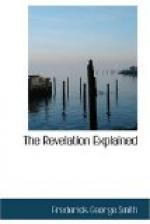11. Behold, I come quickly:
hold that fast which thou hast, that
no man take thy crown.
12. Him that overcometh will I make a pillar in the temple of my God, and he shall go no more out: and I will write upon him the name of my God, and the name of the city of my God, which is new Jerusalem, which cometh down out of heaven from my God, and I will write upon him my new name.
13. He that hath an ear,
let him hear what the Spirit saith unto
the churches.
Philadelphia was once a large and powerful city, and it continued thus until later times. Prior to the time the Revelation was written, it had suffered severely from repeated earthquakes, which caused it to be almost deserted by its inhabitants. Subsequently, however, it recovered and became a prosperous, influential city.
The character Christ assumes toward this church is that of the Holy and True—one who will justly reward them for their patience and perseverance—and by virtue of his possessing the key of David (a symbol of power and authority), he is able to place before them an open door which no man can shut.
The character of this church is wholly unlike that of the preceding. In that, there was nothing to commend, but much to condemn; whereas to this, all is admonition, encouragement, and promise, because they had “kept the word of his patience” and had not denied his name. Christ knew their works and that they were worthy of approval. They still possessed “a little strength” and had not denied his name.
Christ, who always upholds and rewards his faithful followers, although they be few in number and constitute the despised of earth, was not unrighteous that he should overlook this humble congregation of devoted disciples that had kept his word, but he made them a number of special promises because of their faith and perseverance. The first was the assurance that he had set before them an open door which no man could shut. A door is a means either of entrance or of escape, and signifies that God was going to open before them a greater field of enlargement and success, or else would furnish them a sure means of escape and protection from their cruel and relentless persecutors. It will be remembered that the church of Smyrna also received nothing but commendation and encouragement; but there was no promise of an open door to them. On the contrary, they were told that they should be tried, cast into prison, and suffer tribulation ten days. They were comforted, however, with a certain assurance of future reward and a crown of everlasting life. But before the church of Philadelphia there was opened a scene of greater prosperity, deliverance from enemies, greater enlargement, and the glorious prospect of seeing multitudes of souls brought under the influence of the saving gospel of Christ.
The next promise was that of deliverance from opposing Jews, who were to be humbled before them. This refers, doubtless, to persons who had a mere profession of Christianity and who were not recognized by the congregation—the same as the blaspheming Jews of Smyrna. The faithfulness of God’s elect would eventually be the means of bringing them back to an experience of salvation, so that they would worship in the midst of the church again.




